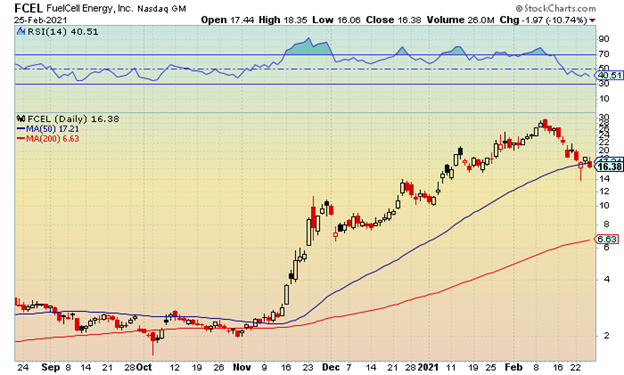Hydrogen pure-play stocks outperformed the overall market in 2020 and continue to do well in 2021. Hydrogen-related investments have attracted investor interest, as bullish sentiment believe the element — which emits no greenhouse gas when burned or used in fuel cells — may be a viable option to help the world meet its climate goals. FuelCell Energy (FCEL), a company that makes stationary power generation products, is just one example of the companies doing particularly well in this segment.
FCEL is focused on developing hydrogen energy, which has massive potential in the future. The company designs, manufactures, sells, installs, operates, and services stationary fuel cell power plants for distributed power generation. Its primary operations are located in the United States, South Korea, England, and Germany.
The company recently announced a partnership with Exxon Mobil (XOM) to leverage FCEL’s proprietary carbonate technology to capture CO2 while producing power at the same time. And last October, FCEL was selected by the U.S. Department of Energy’s Office of Energy Efficiency and Renewable Energy for an $8 million funding award to support the design and manufacture of a SureSource electrolysis platform capable of producing of hydrogen.
The company also has a development partnership with Toyota (TM) to produce electricity, hydrogen and water from directed biogas, part of which will be used to power local operations and fuel a new fleet of hydrogen cars.
While all of this is good news, FCEL continues to lose money and has posted an earnings per share loss of four cents, six cents, seven cents, and eight cents over the past four quarters. Although the company began its aggressive and critical turnaround in 2019 and now appears well positioned to exploit the heightened hydrogen global interest, fundamentals and profits are important to validate higher stock prices.
On that note, FCEL is expected to post a loss of 18 cents per share in 2021 and a loss of 16 cents in 2022. Moreover, the company has done a couple of spot offerings in recent months that has diluted shares. A 34.25 million share offering in the price range of $6.50–$7.00 was issued in December and a 43.5 million share offering was priced at $2.10 last September.
Following the surge towards the $30 level in early February, shares have retreated and are now hovering around the 50-day moving average.
FCEL’s CEO purchased 11,000 shares at a price near $18 in late January, the type of move that is often viewed as a good sign of management’s faith in the stock. However, shares still seem to be overvalued given the near-term and longer-term fundamentals of the company. Although the company has a strong backlog and a strengthened balance sheet, another risk is its solid oxide fuel cell solutions could take much longer to commercialize than anticipated.
While the enthusiasm has been noted, it still appears the bullish sentiment has likely exceeded fundamentals over the near-term. Moreover, the stock has no “buy” ratings on Wall Street. Of the six analysts covering FuelCell, four have issued “hold” ratings and two have “sell” recommendations on the stock with price targets between $8.50 and $15.
While short-selling can be risky, continued closes below the 50-day moving average could lead to another wave of selling pressure. Specifically, a close below the $14 level and the February low at $13.89 could led to additional weakness towards the $12–$10 area.







